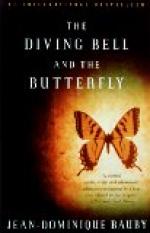And then, what a treat it would be, to get hold of the first rhymes that Watts and Pope ever made. I believe that Watts had been rhyming some time when he got a fatherly flogging for this exercise of his genius, and he sobbed out, between the blows,
“Dear father, do some
pity take,
And I will no more verses
make.”
That couplet was not his first one, by a good deal. The habit, it would seem, had taken a pretty strong hold of him, when the whipping drew that out of him.
It seems to me that the childhood and early youth of a genius are more interesting than any riper periods of his life; or rather, that they become so, when time and circumstances have developed what there was in the man, and when from the stand-point of his fame in manhood, we look back upon his early history. What small beginnings there have been to all the efforts of those who have made themselves masters of the particular art to which they have directed their attention.
I wonder what kind of a thing Washington Irving’s first composition was. There must have been a first one; and, without doubt, it was a clumsy affair enough. If I were going to write his history, I would find those who knew him when he was a mere child, and I would pump from them as many anecdotes about his little scribblings as I possibly could, and I would print them, lots of them. I hardly think I could do the reader of his biography a better service.
I wonder what his first experience was with the editors. These editors, by the way, are often very troublesome to the young sprig of genius. Placed, as they are, at the door of the temple of fame, they often seem to the unfledged author the most disobliging, iron-hearted men in the world. He could walk right into the temple, and make himself perfectly at home there, if they would only open the door. So he fancies; and he wonders why the barbarians don’t see the genius sticking out, when he comes along with his nicely-written verses, and why they don’t just give him, at once, a ticket of admission to the honors of the world. “These editors are slow to perceive merit,” he says to himself.
Your old friend Uncle Frank once set himself up for a genius. Don’t laugh—pray, don’t laugh. I was young then, and as green as a juvenile gosling. Age has branded into me a great many truths, which, somehow or other, were very slow in finding their way to my young mind. The notion that I am a genius does not haunt me now, and a great many years have passed since such a vision flitted across my imagination. But I will tell you how I was cooled off, once on a time, when I got into a raging fever of authorship, and was burning up with a desire to make an impression on the world. I had written some verses—written them with great care, and with ever so many additions, subtractions, and divisions. They were perfect, at last—that is, I could not make them any more perfect—and off they were posted to the editor of the village newspaper. I declare I don’t remember what they were about. But I dare say, they were “Lines” to somebody, or “Stanzas” to something; and I remember they were signed “Theodore Thinker,” in a very large, and as I then thought, a very fair hand.




